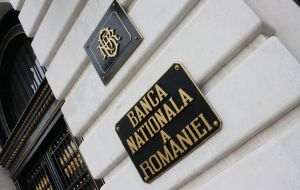The reaction of NBR counselor Cristian Bichi, who posted on the NBR website the following clarifications, is increasingly important for BURSA's readers, because the "bail-in" subject (which BURSA has been debating since 2013) has been heavily debated in the comments section. One of the readers who stands out among the commenters on the bursa.ro website (through his competence and information), who uses the nickname Cristi C, argues, (with documented evidence) that the "bail-in" operation will not be applied in Romania.
Cristian C. Bichi, is also about to convince us, right now, that the transposition in the Romanian legislation of the European Directive for the Resolution of Banks and Investment firms - in short the "Bail-in law" - does not endanger small depositors, neither Romanians nor those in other European countries:
"The equivalence between the internal recapitalization and the seizure of the bank deposits of the population (the retirees' money is also being mentioned in this context, claiming that it is at risk) is also incorrect. Such an approach is mistaken, because nothing would happen to guaranteed deposits (those below 100,000 Euros - per depositor and per bank - protected by the Fund for the Guarantee of Bank Deposits), regardless of whether they belong to individuals or to companies".
Bichi chose to discuss the case of small depositors last.
Before mentioning them, he would enumerate a number of options for saving banks, through mechanisms that would not affect the big depositors either.
Just as I am feeling safer, and I am about to withdraw the company's deposits from the State Treasury, where I've hidden them for fear of the "bail-in", something from the phrase quoted by Bichi raises a red flag: "up to 100,000 Euros".
My publishing house has deposits that exceed 100,000 Euros.
That is money earned through honest means.
All the taxes owed on that money have been paid, including social security.
That is the result of hard work, days and nights of work of a team of tireless, dedicated, talented young people.
And it is money that the business needs.
Well, Cristian Bichi tells us that part of that money - 100,000 Euros - will be safe, in the event of a "bail-in".
That's what he chose to do: to reassure us over that part.
But what about the rest of that money?!
The remaining money amounts to a lot more and, from what Bichi refuses to say, I understand that in the event of a "bail-in", it will be lost or, well, let's say that I may get shares in the bankrupt bank.
Why?
Is that fair?
It is normal for our honestly earned money to be seized in order to save a bank where the management has been, at best case reckless (that is when they didn't outright steal from the company)?
What kind of a law is that?!
Had that been some kind of communist or Nazi regime, I would have at least received a doctrine-based, egalitarian or anti-Semite explanation.
But no, we are in democratic Romania, with a functional market economy, part of democratic Europe - there is no doctrine that would justify the stealing of our money.
Cristian C. Bichi, just like Cristi C., would probably answer this question by saying that there is no bank in Romania that is on the verge of bankruptcy and that my fears are unjustified.
But neither the assurances provided by Cristi C. nor the article posted by NBR advisor Cristian C.Bichi, himself, on the blog of the NBR represent a guarantee against the "Bail-in law".
In fact, Bichi's intervention makes me even more concerned over the safety of bank deposits of less than 100,000 Euros: what is the criteria that was used to establish this threshold?
A European directive.
And what was the criteria of the Directive?
Well, maybe some European clerks put that number on paper and it has remained unchanged, regardless of how many rounds of "quantitative easing" we had on the continent, afterwards, every month, until the Swiss franc blew up.
Europe is in full involution, both politically and from a financial and banking point of view.
If things get worse (which is very likely), just as arbitrarily as the threshold for the guarantee of bank deposits has been set at 100,000 Euros, a few European clerks will lower it to 50,000 Euros, or, as needed, to 10,000 Euros or even to zero.
But no, something like that isn't possible.
Cristi C. and Cristian C. Bichi guarantee it.




























































